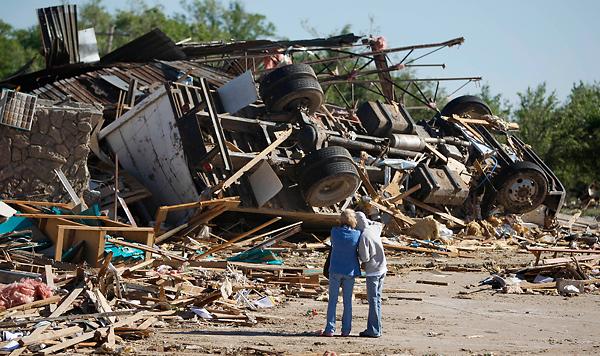 Countless lives were
saved this weekend by vigilant government officials who warned of deadly
tornadoes in Oklahoma, Kansas, Iowa, Nebraska—states whose politics are
dominated by anti-government, anti-science ideologues. Over 100
tornadoes
struck down in 24 hours, but only six people died in Oklahoma, Sen. Jim
Inhofe’s home state, thanks to warnings from the National Weather
Service scientists he has worked to
discredit:
Countless lives were
saved this weekend by vigilant government officials who warned of deadly
tornadoes in Oklahoma, Kansas, Iowa, Nebraska—states whose politics are
dominated by anti-government, anti-science ideologues. Over 100
tornadoes
struck down in 24 hours, but only six people died in Oklahoma, Sen. Jim
Inhofe’s home state, thanks to warnings from the National Weather
Service scientists he has worked to
discredit:
The tornadoes were unrelenting – more than 100 in 24 hours over a stretch of the Plains states. They tossed vehicles and ripped through homes. They drove families to their basements and whipped debris across small towns throughout the Midwest. In some areas, baseball-size hail rained from the sky.
And yet, in a stroke that some officials have attributed to a more vigilant and persistent warning system, relatively few people were killed or injured.
Wichita, Kansas, the headquarters of Koch Industries, suffered $280 million in damage from a ferocious twister, but the “ever-increasing government” demonized by the Koch brothers prevented any loss of life.
Greenhouse pollution from the fossil fuel industries that control the region’s politics is making our weather more extreme and dangerous. The heat trapped by carbon pollution is powering these earlier and more intense storms with record-warm waters in the Gulf of Mexico. As Dr. Jeff Masters wrote on Friday:
This is the warmest March value on record for the Gulf of Mexico, going back over a century of record keeping. During the first two weeks of April, Gulf of Mexico waters remained about 1.5°C above average, putting April on pace to have the warmest April water temperatures on record. Only one year in the past century has had April water temperatures in the Gulf of Mexico more than 1.1°C above average; that year was 2002 (1.4°C above average.) All that record-warm water is capable of putting record amounts of water vapor into the air, since evaporation increases when water is warmer. Because moist air is less dense than dry air, this warm, moist air flowing northwards from the Gulf of Mexico into the developing storm system over the Plains will be highly unstable once it encounters cold, dry air aloft. The record-warm waters of the Gulf of Mexico are a key reason for the high risk of severe weather over the Plains this weekend.
